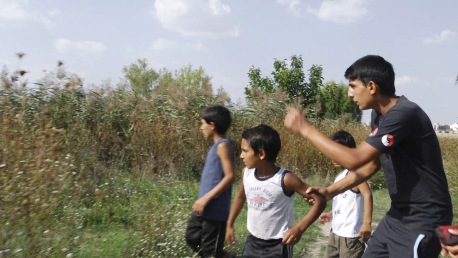

The true story of a large Romanian family living in a wilderness area facing the threat of being forced to move to the big city.
The picture opens with a group of boys playing in a lake, trying to catch fish by hand, chasing birds, having fun being boys. They are part of a large family living in what appears to be a remote wilderness area, a mother and father and their nine kids with dogs, playing and running about, but also hunting and foraging to survive. The camera then pans up—to our amazement we see that their bit of wilderness, this deserted marshland, is right next to a major city. It is Bucharest, the capital of Romania. The family are the Enaches and the film is called Acasă, which means “home.” The distributors are calling the film Acasă, My Home, which is repetitive, but does make things clearer for an English-speaking audience.
Their home is an abandoned reservoir on the outskirts of the city that fell into disuse after the fall of the Communist regime in 1989. The patriarch of the Enaches, Gica, bitter about civilization after he suffered unjust prison time, moved there almost twenty years ago with his wife Niculina, built a little shack, got some pigs and chickens, and just kept having kids. The oldest, Vali, is sixteen, and is tasked with doing a lot of the work around this little camp, and there’s tension between him and Gica, who is an absolute dictator and does a lot of sitting around.
Acasă is the debut documentary of director Radu Ciorniciuc. He and his crew won the complete trust of the family, co-existing with them for months, and letting the camera run while they go through the routine actions of each day. But what’s routine to them looks pretty remarkable to us—each kid, except the two youngest, have jobs and responsibilities, catching fish, lugging water, and so forth. There’s also a lot of time for just playing around, and in this environment, in the midst of nature, it’s easy to start thinking that this is an idyllic life. The kids themselves seem to think so, most of the time, loving to run and be outdoors, but of course they don’t know any other life. And it’s not so simple, as is true for any situation. They barely get by, the father earning spare cash by giving people informal tours of the area. The conditions aren’t that clean either, with nine kids all sleeping in one big bed, and in fact it all looks like really hard work.
In any case, this is the life the parents have chosen, and it has its advantages and drawbacks. As the film opens, we discover that the Bucharest authorities have been sniffing around, sending people in to inspect the place, including their version of child protective services. In a remarkable early sequence, the city people are spotted coming towards the marsh, and Vali is in charge of whisking all the kids away to a hideout further into the brush. They’re not spotted that time, but as the movie goes on, the pressure increases. Eventually the hammer falls. The government has decided to declare the area a nature preserve. The Enaches are going to be moved to the city, and the kids have to go to school.
The process that we witness the family having to go through in the second part of the film is very hard and painful. Working, paying the rent, adjusting to the starkly different quality and rhythm of city life, it all takes a toll. The parents don’t adjust well. The children do a little better, learning how to read and write pretty quickly, which is one of Vali’s complaints that he makes against his father, that he never bothered to teach his kids to read. They also face discrimination in the city, and from the barest of hints I realized that the Enaches’ ethnicity is Roma, or what people used to call Gypsies. But Ciorniciuc chooses not to be explicit on this point, perhaps worrying that the ethnic element may obscure the greater meanings of the film, such as the duality between modernity and ancient customs, the city and the country.
The story brings up a lot of emotions. Some of the kids wish they could go back to their relatively freewheeling existence in the marsh. Others, including Vali, are determined to become civilized, so to speak, something which we see can be both inspiring and damaging. Life in the wild was difficult and backward, but this supposed civilization is harsh and unforgiving. In Acasă we take a journey with this unusual family and are confronted with questions about how we adapt to society, and what is gained, but also very much what is lost along the way.

